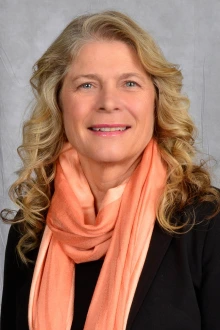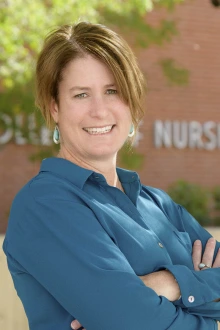Western Academy of Nursing honors 4 from College of Nursing
Four University of Arizona College of Nursing faculty were honored by the Western Institute of Nursing during their annual conference in April. Ruth Taylor-Piliae, PhD, RN, FAHA, FAAN, a professor and the interim PhD program director, received the Regional Geriatric Nursing Research Award: Senior Researcher. Inducted as fellows into the Western Academy of Nurses were Patricia Daly, PhD, FNP-BC, ENP-BC, FAANP, an associate clinical professor; Cheryl Lacasse, PhD, RN, AOCNS, a clinical professor, RN-MSN program coordinator and director of teaching/learning practice and evaluation; and Helena Morrison, PhD, RN, an associate professor.
WIN is one of four regional nursing research organizations in the U.S. whose members include individual researchers, clinicians, educators, students, academic institutions and health care organizations. According to their website, WIN’s mission is to improve the health of the public through visionary leadership in nursing research, practice and education.
WIN established the Western Academy of Nurses in 1989 to recognize and honor nurses who have been actively engaged in WIN and have demonstrated excellence in nursing research, practice and/or education. Membership in WAN is by nomination, and this year three of the four inductees were from the UArizona College of Nursing.
Regional Geriatric Nursing Research Award: Senior Researcher
Ruth Taylor-Piliae, PhD, RN, FAHA, FAAN
Professor and interim PhD program director

Ruth Taylor-Piliae, PhD, RN, FAHA, FAAN
Taylor-Piliae has been a member of WIN for 20 years and a UArizona College of Nursing faculty member for 16 years.
“I am honored to be recognized for my research contributions among older adults with a chronic illness.
“I am recognized internationally as a cardiovascular nurse scientist and mind-body exercise interventionist, with training in cardiovascular epidemiology and clinical trials. My research is focused on promoting physical activity and improving patient-centered outcomes among older adults with heart disease and stroke through the implementation of innovative non-pharmacologic interventions such as tai chi. As a nurse-scientist, I have developed tai chi exercise interventions to improve physical function, reduce falls and improve psychosocial well-being and quality of life. These interventions have enhanced rehabilitation and recovery from cardiovascular disease among older adults. I conducted the first study in the U.S. testing tai chi among stroke survivors.”
Inductees into the Western Academy of Nurses
Patricia Daly, PhD, FNP-BC, ENP-BC, FAANP
Associate clinical professor

Patricia Daly, PhD, FNP-BC, ENP-BC, FAANP
Daly, who has been a member of WIN for 12 years and on the UArizona College of Nursing faculty for nine years, also received the 2023 Outstanding Service to the Board of Governors Award during this year’s WIN conference. She was elected to the WIN Board of Governors in 2019 and assumed the role of secretary treasurer in 2020.
“It is an honor to be inducted into the Western Academy of Nurses. It’s an honor to be recognized as a leader in determining the direction of nursing, as well as to be included in a group of amazing colleagues whom I respect, and who contribute so much to our profession and the health of the populations we serve.
“The Academy provides support and mentoring to students and nursing colleagues. This aligns with my core belief that as faculty, we are tasked with developing future nursing leaders. I have benefited from the support of my two nominators, Drs. Judy Berg, and Joan Shaver, both of whom exemplify nursing leadership. I am fortunate to have their mentorship. In turn, since assuming the role of chairing doctoral students in 2016, 19 of my students have presented at WIN, resulting in their achieving peer-reviewed publication prior to graduation.”
Cheryl Lacasse, PhD, RN, AOCNS
Clinical professor, RN-MSN program coordinator and director of teaching/learning practice and evaluation

Cheryl Lacasse, PhD, RN, AOCNS
Lacasse has been a member of WIN for nine years and on the UArizona College of Nursing faculty for more than 20 years.
“To be selected as a member of the Western Academy of Nursing is a true honor and recognizes my contributions to the nursing profession and leadership in mentoring and education of future nurses and those who are advancing their careers in health care as clinicians, scientists or health systems leaders.
“Being a member of the Western Institute of Nursing provides many opportunities to network and collaborate with colleagues across the western states that often lead to exciting insights into my professional scholarship projects and inspire the growth and development of all levels of nursing students.”
Helena Morrison, PhD, RN
Associate professor, Biobehavioral Health Science Division
Morrison first joined WIN as a graduate student in 2008. She has been on the UArizona College of Nursing faculty for nine years.

Helena Morrison, PhD, RN
“Being a part of WAN is impactful and meaningful to me because I greatly respect and admire the nurses that are WAN members and active in WAN. I was reviewed and chosen by this group to join their ranks, and that is just astounding to me. I would like to be active in WAN as well, as I learn more (about WAN) and grow in the organization. I look forward to this service.
“WIN is an important part of my professional growth and an opportunity to network in the nursing advanced science/practice setting. Although my science often spans disciplines—being heavily a part of the bench in the ‘bench to bedside’ process—WIN has included me and my science in their opportunities for dissemination and professional growth. In addition, WIN is an excellent setting for my mentees. I love seeing and supporting them as they are swept up in the excitement of science and disseminating their ideas. Being a part of WIN is something that I look forward to every year and I am so happy to now be engaged at multiple levels, WIN and WAN.”

